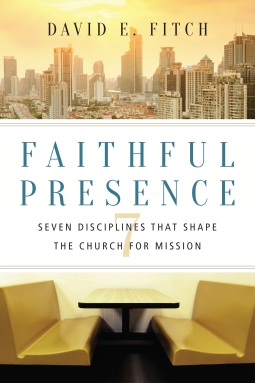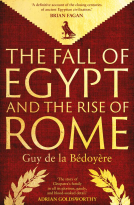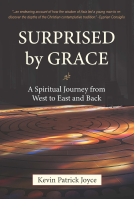
Faithful Presence
Seven Disciplines That Shape the Church for Mission
by David E. Fitch
This title was previously available on NetGalley and is now archived.
Send NetGalley books directly to your Kindle or Kindle app
1
To read on a Kindle or Kindle app, please add kindle@netgalley.com as an approved email address to receive files in your Amazon account. Click here for step-by-step instructions.
2
Also find your Kindle email address within your Amazon account, and enter it here.
Pub Date Dec 04 2016 | Archive Date Feb 14 2017
InterVarsity Press | IVP Books
Description
In Faithful Presence, David Fitch, a noted pastor and scholar, introduces a vision for the witness of the church in today’s world that addresses this question. Recognizing that people struggle to see God’s presence in their lives outside the walls of a Sunday church service, Fitch examines seven disciplines from Scripture that reintroduce the church to the reality of God’s constant presence in their midst. Through numerous examples and stories, he demonstrates how these revolutionary disciplines can help the church take shape in and among our neighborhoods, transform our way of life in the world, and advance the kingdom.
Advance Praise
"Faithfulness is an intimidating idea, so the church can be tempted
to find speedy shortcuts to growth, mission, and relevance. David Fitch
is helping the church outgrow its obsession with fads to break open
space for the reappearance of God's real-time presence in our
neighborhoods. There is certainly unflattering press about the church in
today's headlines, but Faithful Presence gives me genuine hope
about what the body of Christ can be when it gathers around these seven
practices. This book is appropriately critical at times, but it is
fundamentally grounded in inspiring the shaping of a community for God's
witness in the world. David Fitch has laid out a pathway for the church
being the church again!"
—Dan White Jr., cofounder, The Praxis Gathering, author of The Church as Movement
"When I get up on the average day, I don't know how to transform the
world. But I know how to pray, show hospitality, and proclaim truth.
With scholarly care and pastoral zeal, David Fitch reminds us that it's
in long-term, communal devotion to small but transformative practices
that we both discover and reflect the faithful presence of God. Faithful Presence
gives us permission to step aside from our own efforts at greatness,
encouraging us to give our time and attention to disciplines that reveal
and proclaim God's presence in our churches, homes, and neighborhoods."
—Mandy Smith, lead pastor, University Christian Church, author of The Vulnerable Pastor
"In Faithful Presence David Fitch brings heard-it-all-before
church leaders both profound insight and a new imagination for
spiritual practices that lead seamlessly to an authentic, faithful
presence with God in the world—a faithful presence that results in
intuitive and organic mission in all aspects of our everyday lives."
—Todd Hunter, bishop, Churches For the Sake of Others, author of Giving Church Another Chance
Available Editions
| EDITION | Paperback |
| ISBN | 9780830841271 |
| PRICE | $17.00 (USD) |
| PAGES | 256 |
Links
Featured Reviews
 Conrade Y, Reviewer
Conrade Y, Reviewer
How do we manifest Christ's love in a world of brokenness and pain? Is there something Christians can do to counter the social injustice and poverty disparities? Can the Church do more than mere handouts? If there is a genuine desire to be part of the solution, how then do believers go about doing it? According to author David E. Fitch, the answer is in the title of this new book entitled, "Faithful Presence." He defines it as follows:
"Faithful presence names the reality that God is present in the world and that he uses a people faithful to his presence to make himself concrete and real amid the world’s struggles and pain. When the church is this faithful presence, God’s kingdom becomes visible and the world is invited to join with God. Faithful presence is not only essential for our lives as Christians, it’s how God has chosen to change the world. In this book I aim to describe what this faithful presence looks like."
Starting with how his own life was changed at a nearby McDonald's restaurant, he shares about networking with strangers merely by being present and having a listening ear to people around him. That McDonald's soon became some kind of a church for him as he prays with and minister to people willing to open up to him. If God can use one McDonald's, surely He can use any public place! He advances James Davison Hunter's analysis of the Church with an added focus on the role of community. For he believes that the secret of wanting to help others is to have been helped first. Part One of the book deals with the what and why of Faithful Presence. Part Two contains the seven disciplines to demonstrate the how.
The first is the discipline of the Lord's Table, essentially the Communion ritual and spiritual significance of gathering in the Lord's Presence. It is about submitting to Christ and in turn, submitting to one another. We can think of the table in three circles: close circle of intimacy; dotted circle of hospitality; and the half-circle of reaching out. These three circles bring about the three ways in which the rest of the disciplines can be practiced. The Discipline of Reconciliation reflects what God in Christ has done for all of us, that we be reconciled with God. This discipline essentially means we live as kingdom people who proclaim God's presence into the lives of the people we meet, especially in relationships of conflict. The Discipline of Proclaiming the Gospel distinguishes us in that we love because of the gospel. Proclamation is different from teaching in that it announces and must precede teaching. It is not a description of facts but a statement of truth to be wrestled with. The Discipline of Being with the "Least of These" is an intentional initiative to distant ourselves from seeking the rich, the powerful, and the famous; to look to the poor, the weak, and the neglected. Fitch creatively calls it "withness." The Discipline of Being with Children reminds us of the need to invest our lives with the next generation. Just like Jesus who said that the kingdom belongs to the children, we too can practice the same by reaching out and be present with them through our word and deed. The Discipline of Fivefold Gifting is based on Ephesians 4 of the five offices that we have been called into: Apostles; Prophets; Pastors; Evangelists; Teachers. Each office fulfills a particular area of ministry essential for demonstrating kingdom presence. The Discipline of Kingdom Prayer is an important reminder to anchor ourselves in the Source of all good works: God. Such a prayer posture shapes all of our lives and our works. Being present is not simply humans showing up but God manifesting Himself through our works.
I like the way Fitch has incorporated the nature and truth of the kingdom in all of the disciplines. This book is not simply about spiritual disciplines that we all must do. Neither is it some list of spiritual practices that can be executed and isolated from the rest. Fitch makes sure that all the disciplines are connected intricately and intimately. The close, dotted, and half-circles essentially outlines the extent of each discipline reminding us that being present involves the whole person, both inner and outer. It presumes the presence of God in all that we do. As we are reminded of the Lord's table and how Jesus has spent time with his disciples, we too can follow Christ by learning to share the table and to commune with people everywhere we go. The circle idea is a metaphor for relationships and neighbourliness. Everything we do, we do it out of the close fellowship with God. We do it out of a concern for the gospel to be shared. We do it out of a genuine desire to be present in the Name of God for the sake of people. In the process, we become shaped as kingdom people who do not simply utter "Thy kingdom come" but carry out the full meaning of it.
Fitch is B. R. Lindner Chair of Evangelical Theology at Northern Seminary Chicago, IL and is the founding pastor of Life on the Vine Christian Community in the northern suburbs of Chicago. He is passionate on issues regarding mission and cultural engagement. This book is a fruit of this very passion.
Rating: 4.75 stars of 5.
conrade
This book is provided to me courtesy of InterVarsity Press and NetGalley in exchange for an honest review. All opinions offered above are mine unless otherwise stated or implied.
 JT T, Reviewer
JT T, Reviewer
Community! Community! Community! We are missing it. The Lord's Supper is about loving God and loving your neighbor as yourself and David captures it in this book. It is about growing deeper in your faith within community and what you are able to accomplish together for God's Kingdom. What a wonderful resource for churches and pastors.
A ecclesiastical reflection on the author's experience in ministry exhorting more holistic service and faithfulness to Christ in a space between missional and incarnational: faithful presence in the Kingdom.
The author sets forth seven disciplines for faithful presence (the Lord's table, reconciliation, proclaiming the Gospel, being with the "least of these", being with children, the fivefold gifting, and Kingdom prayer), and describes them in terms of presence within the "closed circle" of the dedicated members of a local congregation, the "half dotted circle" of the local church members, regular visitors, and people who express interest in faith, and also the "open circle," the greater community at large.
The author does well at demonstrating the importance of all three aspects of ministry and presence so that the work may thrive: to focus only on the closed circle is to turn to maintenance mode, but focusing only on the open circle is to lead to exhaustion and abandonment of the Gospel to become a social service organization. The "half dotted circle" becomes a very important place in that regard.
Many good things about each subject, and some points of disagreement, as always. The section on the "least of these" is very powerful, and does well to overturn the paternalistic and systemic model of benevolence on its head, emphasizing instead community and sharing and joint participation in ways that empower all involved. Kingdom prayer, especially as contrasted with constant striving, is all important. The fivefold gifting is an interesting way of taking the first century situation and bringing it to the twenty-first without necessarily becoming charismatic, although in so doing there is some disconnect from the original use of some of the terms. Being with children is rather convicting; evangelism models are very fit for 21st century life, since they focus on presence and relationship, the embodiment of the message as opposed to rhetorical flourish. Don't sleep on the appendices either, especially 3 (warning about the extremes of missiology and incarnation) and 4 (looking at the "least of these" as all the poor, but seeing Christ's presence in their midst as the work the Christians did by bringing the Kingdom to bear on their condition).
Highly recommended.














